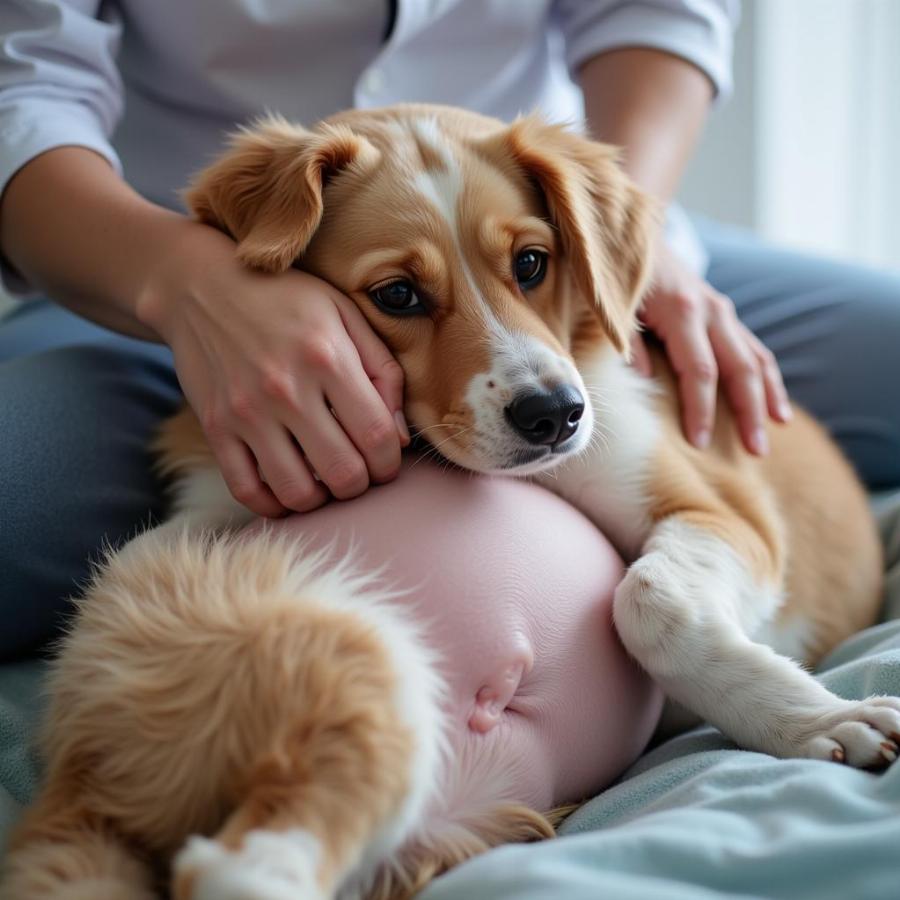If your dog just ate chicken wing bones, you’re likely feeling anxious and unsure of what to do next. Cooked chicken bones, especially the small and brittle ones from wings, can splinter and cause serious internal damage. This situation requires careful monitoring and potential veterinary intervention. Understanding the risks and knowing what steps to take can make a significant difference in your dog’s well-being. This article provides essential guidance on how to handle this potentially dangerous situation.
Why are Chicken Wing Bones Dangerous for Dogs?
Cooked chicken bones become brittle and easily splinter when chewed. These sharp fragments can pose a variety of threats to a dog’s digestive system. They can cause choking, scratches or punctures in the esophagus, stomach, and intestines. Blockages in the digestive tract are also a serious concern.
What to Do If Your Dog Ate Chicken Wing Bones
1. Assess the Situation: How many bones did your dog eat? Was it one small bone or a whole plate of wings? The severity of the situation depends on the quantity and size of the ingested bones.
2. Monitor Closely: Watch for signs of distress, such as vomiting, diarrhea (potentially bloody), lethargy, loss of appetite, abdominal pain, whining, or difficulty defecating. Changes in behavior are crucial indicators of potential problems.
3. Contact Your Veterinarian: It’s always best to contact your vet immediately, even if your dog seems fine. They can provide advice specific to your dog’s breed, size, and health history.
4. Follow Your Veterinarian’s Instructions: Your vet might recommend inducing vomiting, monitoring your dog’s stool, or bringing your dog in for an examination. Follow their advice carefully.
5. Offer Supportive Care: If instructed by your vet, you might offer bland foods like plain boiled chicken (boneless and skinless) and rice to help cushion the bones and facilitate their passage.
What Not to Do
1. Don’t Induce Vomiting Without Veterinary Advice: Inducing vomiting without professional guidance can sometimes worsen the situation, especially if the bones are already lodged in the esophagus.
2. Don’t Give Your Dog Laxatives: Laxatives can speed up the digestive process, which might seem helpful, but can actually increase the risk of bone fragments causing perforations as they move through the intestines.
3. Don’t Ignore the Situation: Even if your dog appears asymptomatic, internal damage might be occurring. Prompt veterinary attention is crucial.
Can Dogs Eat Chicken Bones at All?
The short answer is no, especially cooked chicken bones. Raw chicken bones are slightly less risky because they are more flexible, but they still carry the risk of bacterial contamination like Salmonella. It’s always best to avoid giving your dog any type of chicken bones. There are plenty of safe and healthy chew toys available that satisfy a dog’s natural chewing instinct. Consider hide and seek dog toys for a fun and engaging alternative.
How to Prevent Your Dog from Eating Chicken Wing Bones
Prevention is always the best approach. Be mindful of where you discard chicken bones, and make sure they are inaccessible to your dog. Securely store leftovers and never leave plates unattended. Educate family members, especially children, about the dangers of feeding chicken bones to dogs. If you’re concerned about bone marrow specifically, see our article on can dogs eat bone marrow.
Expert Insights
Dr. Emily Carter, DVM, emphasizes, “Chicken bones are a common cause of gastrointestinal emergencies in dogs. The seemingly harmless act of sharing a chicken wing can have devastating consequences.” Dr. Carter adds, “Early intervention is key to a positive outcome, so don’t hesitate to contact your veterinarian if you suspect your dog has ingested chicken bones.”
 Veterinary Examination for Ingested Chicken Bones
Veterinary Examination for Ingested Chicken Bones
Conclusion
If your dog ate chicken wing bones, swift action and veterinary consultation are essential. While the situation can be stressful, understanding the potential risks and taking the right steps can significantly improve your dog’s chances of a full recovery. Remember, prevention is the best medicine. Keep chicken bones out of your dog’s reach and provide safe alternatives for chewing. For a deeper understanding of this topic, you can also read our article on my dog swallowed a chicken bone. Knowing what to do if chicken dog bones are ingested can be crucial.
FAQ
1. Can my dog pass chicken wing bones without any problems? While some dogs might pass small bone fragments without incident, there’s always a risk of complications.
2. What are the signs of a blockage caused by chicken bones? Signs of a blockage can include vomiting, diarrhea, constipation, loss of appetite, and lethargy.
3. How long does it take for a dog to pass chicken bones? It can take anywhere from a few hours to several days for a dog to pass ingested bones.
4. Will my dog need surgery? The need for surgery depends on the location and severity of the blockage or injury caused by the bones.
5. What can I feed my dog after he eats chicken wing bones? Follow your veterinarian’s instructions regarding feeding. They might recommend a bland diet. In cases of diarrhea, consider reading what can i give my dog if he has diarrhea.
6. How can I prevent my dog from eating chicken bones in the future? Properly dispose of chicken bones and educate family members about the dangers.
7. Are there any safe bones for dogs to chew on? Avoid giving cooked bones of any kind. There are many commercially available dog chews that are safe and designed for chewing.
Beaut Dogs is your trusted source for all things related to dog care, offering reliable and expert advice on various breeds and their specific needs. When you need support, please contact us at Email: [email protected] for detailed and accurate answers from Beaut Dogs. Visit https://beautdogs.com for more insightful articles and guidance on ensuring your furry friend’s health and happiness.